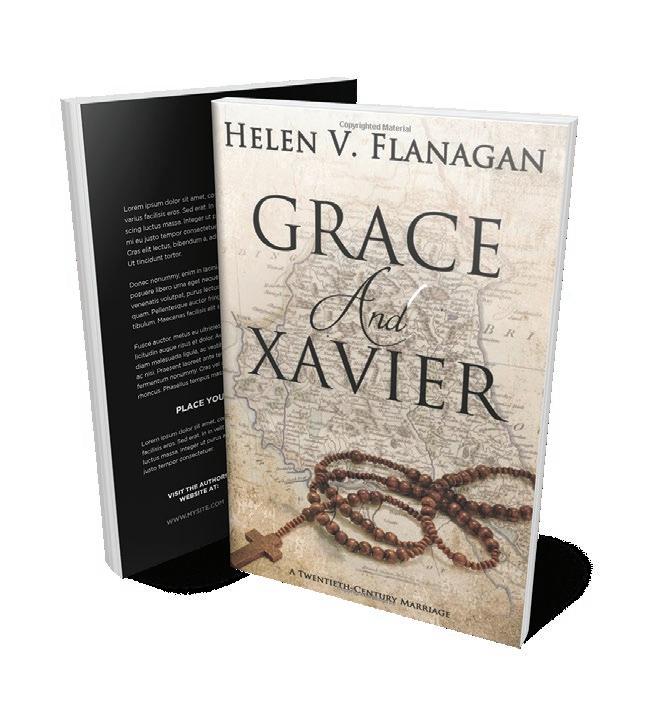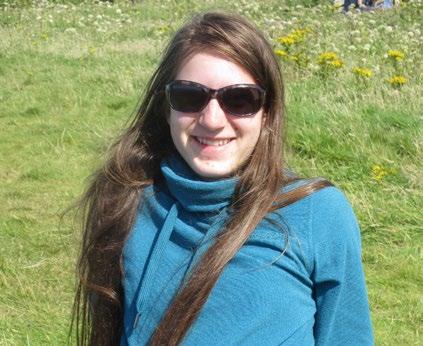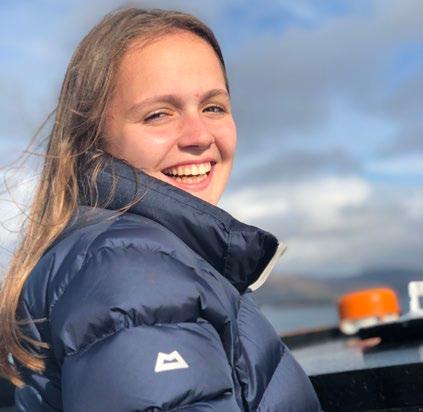
21 minute read
OGA GRANTS
Jessica Howard-Johnston
(Class of 2011)
As a live news producer living in Paris, I experienced the lockdown under the particularly strict rules enforced in the French capital. No exercise outdoors between 10am-8pm, every time you left the house you had to fill out a form and we experienced regular police patrols. It was a bizarre period, but I had three saving graces which kept me sane:
1. The golden ticket of having an “essential worker” form meant I could go beyond the 1km perimeter within which most French people were confined, albeit just to go into work! Being able to go into the newsroom and change locations on a daily basis was liberating. It was also rewarding - as a producer of global live news, I felt like I was doing my bit (albeit as a small cog) to help the world see and understand the pandemic and the effect it was having on all corners of the globe. The pandemic threw up all kinds of new challenges for us as an international news agency. With travel limited, news outlets were even more reliant on us and our thousands of journalists around the world. The images we were handling were at times unbelievable - the Champs Elysées deserted of traffic and people; world leaders meeting via Zoom; military patrols enforcing lockdown in Johannesburg; makeshift hospitals being set up in Central Park; and ice rinks being used as morgues in Madrid.
2. The nightly claps for healthcare workers. Paris is a largely apartmentdwelling city, and from across your courtyard or street, through the tall Haussmannian windows, there were the silhouettes of equally confined neighbours. Every evening at 8pm, Parisians came to their windows and balconies to join in a round of applause for medical staff working on the front line. A nightly opportunity to exchange smiles, 'bonsoirs' and gentle 'we're all in this together' nods with the strangers you didn't realise were neighbours, making confinement feel less lonely.
3. My St George’s girls! My school friends were my rocks - we’re now all over the place (Australia, Canada, UK, France) but this didn’t stop our thriceweekly Zoom calls - doing exercise classes, quizzes and Friday night ‘pub’ drinks....!
Ellen Geddes (Class of 2019)
I have just finished the first year of my nursing degree at the University of Edinburgh, alongside which I work as a waitress for a golf club and also volunteer at St Columba’s Hospice. I came home from halls on 15 March and stayed at home during lockdown with my family.
Prior to lockdown, I was getting ready to begin a twelve-week placement in both the community and hospital setting for my degree but, due to coronavirus, it was decided that first year students would not go on placement. This has left me and my fellow students with 450 hours of placement to catch up on before we graduate in three years’ time! It currently looks like we will be aiming to get through most of these hours in year two, to minimise disruption to our Honours years. To help prevent a second spike in the virus, our lectures, tutorials and clinical skills will be online and they will try to get us into hospital to practice these skills before we go out on placement in smaller groups, to comply with government guidelines.
Last year I was part of the youth pilot volunteer scheme at St Columba’s which aimed to bring more young people into the hospice and for them to help out in their various teams (myself and another alumna Laura Cameron were the first to participate). After that finished, I planned to go back to St Columba’s to start training to be a patient support volunteer but, due to lockdown, I couldn’t do the training. I hope that this will resume at some point.
When lockdown was eased, I felt that I could help more than by staying at home – because of my age and good health I started looking at options and applied to care homes to help as a care assistant. However, by chance, I received a call from a lady I babysit for asking if I would be able to look after her three young children for a few days a week so that she and her husband could work normal hours. I have been doing this since childcare was allowed in homes – I have become a nanny 9am-5pm for two or three days a week.
Lockdown has shown me how happy I am in my life. I love my course and the people on it, I love the new friends I have made at university. I like my job and the people I get to work with and the feeling I get from volunteering cannot be compared to anything. When I am living my ‘normal life’, I often get caught up in the busy-ness of it and don’t stop to enjoy it, however I realise I do enjoy that busy pace and part of me does miss it.
I have enjoyed being home and spending more time with my family. I love being with them and that has been my highlight of quarantine, a time when we can all be together and not It was not long since my school friends and I all went off in different directions to start a new chapter of our lives, and we were all so excited for the times when we could come back together and share stories, spend time together and create more memories. Sadly, lockdown and coronavirus prevented that. Zoom calls could only do so much. I was annoyed that finally we were all back together in the same place, but we couldn’t even see each other. Those friendships mean so much to me and I had missed the girls so much, so I was excited to get together in the garden (socially distanced) and be with them all in person. Several socially-distanced walks and picnics later, I am still anxiously waiting for the day when we can see each other again without the restrictions.
With the Wi-Fi unable to cope with all of us at home, I have spent much less time on my phone and laptop and rediscovered time for reading. Without the distractions, I have made my way through over 40 books since 23 March – a lovely respite from a busy daily life.
Marion Fairweather (Class of 1983) In 2019, I worked as the French Global Fundraising Manager for The World's Big Sleep Out run by Social Bite. I was very proud to be part of a global scale project working for an organisation recognised by Meghan and Harry, Leonardo di Caprio and George Clooney. During this time, I had the opportunity to discover many new things about the world and myself, meet new people and learn a lot work-wise. One of the best memories was attending a dinner at the EICC to hear Malala Yousafzai, the famous Pakistani activist for female education, being interviewed by Jon Snow.
I knew that 2020 would be different, but never could I have imagined it like this. I was planning to pursue literary translation studies and had been picked by Stafford House to work as a TEFL teacher at Napier University’s Craiglockhart Campus. Never mind a couple of holidays thrown in there.
It was a new laptop which became a lifeline in March 2020. Whilst civilisation seemed to be collapsing all around me, thanks to technology I was able to use social media networks and recruitment sites freely and, eventually, after weeks if not months of seeking new employment, I found a dream translation job.
For the last few weeks, I have been working as a French translator for a think tank called Global Virtual Village, translating articles for the blog section of their website, and helping them by translating for other sides of their business to recruit prospective new employees, programmes for podcasts on social issues and interviews with podcast hosts and guests. I have been able to continue French Literary Translation Studies with the French Institute by taking the online translation course delivered on Zoom. This has not only ensured academic continuity but kept me in touch with the outside world. It also ensured that I didn't miss out on the knowledge and skills I needed to launch a career as a translator.
Eventually I developed a new routine, working for Global Virtual Village online, online translation studies twice a week and a daily walk. This time has helped me reassess what I really want from life. I already knew the basics – that I would like to work in music or literary translation, perhaps live in France one day – but, apart from that, I have always wished that I had more time to enjoy life. It has been great to have time to think about healthy eating, enjoying the simple things and the importance of regular exercise and fresh air. It has given me time to relax which was also unexpected and a chance to rethink what is important to me. I've been working in business development for a few years and it has been an invaluable experience, creating opportunities to use my languages both to earn money and for good causes but, somehow, I have never quite felt that it was the right career for me. So, having had time to re-evaluate, I will probably continue translating and / or become more involved with TEFL teaching after the restrictions have been lifted, as well as continuing to be involved in music in some shape or form.
The Edinburgh Music Club, of which I am a member and a past Chairman, has had to cancel all its meetings. I had become accustomed to performing there regularly, as well as listening to the other members every month, and that, as well as the cancellation of all choir activities, has left an emptiness in my life which has been hard to replace. The Music Club discussed potential concerts on Zoom, either live or recorded, but we haven't gone down that route yet. My Sports Club cancelled tennis, which I would usually have been playing from March to August, and it has been difficult to adjust to not using this skill over this period and not seeing my friends at the Club. However, hopefully we are starting to see some return to a new kind of normality with these activities and that is very welcome.
Like the French Institute, universities and educational organisations have been able to reinvent themselves online, and I was one of over 1,000 people to tune into the Sebald Lecture on Translation (founded in 1989) and watch David Bellos deliver this online.
Finally, like a phoenix rising from the fire, I was directed by the University of East Anglia to consider enrolling in an online translation teachers’ workshop held in Rome. Not perhaps the foreign holidays I'd planned - but certainly a silver lining in the clouds!
A LITERARY
LOCKDOWN
My Lockdown Story by Anne Everest (Head of St George’s 2010-2016)
Shortly after I retired from my role as Head of St George’s, I was handed the manuscript of a novel. The story of Grace and Xavier had been written by my older sister, Helen, who had died in 2006. Her partner had asked me if I would prepare it for publication. To my shame, it took the lockdown to force me into action, largely because I had only a printed copy to work from: I had to type out 300 + pages, while adapting and editing the story, and - with two-fingered typing - it was going to take a long time! At the start of lockdown, I had typed up only 50 pages; by the beginning of May, just before what would have been Helen’s 75th birthday, I had submitted the novel for publication.
My half-sister, Helen Flanagan, was born the day after VE Day, and so was 11 years older than me. The central character of her novel, Grace, is even older. What binds us is that we all seem to have gone to the same secondary school. When I arrived at St Mary’s Grammar School for Girls in Hull in September 1968, I was constantly reminded that my sister Helen had been an outstanding scholar there: not only were the nuns (Sisters of Mercy) always prompting me to work hard like my big sister, but every morning at assembly the wooden Honours Board mounted in the school hall prompted me to remember that Helen had been awarded a State Scholarship (a prestigious financial award made to those who had demonstrated academic excellence) in 1962. Helen went to university when she was only just 17 and went on to graduate in Russian and French in 1966 from Liverpool University (having refused to return for an extra term at school to sit the Oxbridge entrance examinations). She sat her Finals the month after our father died, when she was just 21 and I was nine.
Although I was the child of my father’s second marriage, I regarded Helen as my proper older sister, and she was a huge influence on my early life. I went into teaching as she had done, though I was a stay-at-home mum for almost a decade, and Helen had no children. Before her early retirement on medical grounds, she had been Deputy Head of Alderman Peel’s School in Norfolk. Unlike me, Helen was dogged by ill health through much of her adult life. Her own mother had died young and she had inherited some of her mother’s health issues. At 50 she had open heart surgery and a triple by-pass operation. She died at the age of 61.
I had known about the existence of her novel, though Helen had never shown it to me (I think she thought me too judgemental on literary matters). I finally got to read it in the first weeks of my retirement from St George’s. What immediately struck me was that

this ‘novel’ was a thinly disguised account of our paternal relatives’ lives, going back to the beginning of the twentieth century, and to Hopwood Street in Hull, where they had once lived. Our father, Charles, had been the youngest son of Patrick Flanagan. Patrick was a founder member of the local Labour Party and was a leader of the first national Bricklayers’ Union; by the time he died, in 1921, he was a Justice of the Peace and a member of Hull’s City Council. He was renowned for introducing the first Council houses to the city in 1919. In Helen’s story the patriarchal character, ‘Red’ Jack Brennan, is firmly based on Patrick Flanagan, our grandfather. As I became intimately involved with this novel, not least from typing out every single word (and not all of them accurately), I was reminded of many family anecdotes that Helen had adapted to suit her plot. She had also plundered family sayings, and I recognised things that my own children had said and done in front of their Auntie Helen (like the precocious five-year old child who claims to be eight!) I seemed to have been included too, or I think I am: Grace’s niece, Julia, certainly shares some of my own childhood character traits.
Working on this book was, of course, a labour of love, but it was also a rewarding and timely reminder of the family from which I had come. My father’s family is far more remote from me than my maternal relatives. My father had been the youngest of seven children and he was almost fifty when I was born; my paternal cousins were all adults when I was a small child and, though I went to the same school as Grace, it was in a modern (sixties) building by the time I attended, and Hopwood Street is no more.

It was with some trepidation that I submitted the novel for publication in May 2020: this was my family’s story. And holding the finished book in my hands was an intensely emotional experience. ‘Grace and Xavier’ by Helen Flanagan is now available from Amazon. It is, I hope, an entertaining and moving story.

THIS BOOK IS AVAILABLE ON
SYNOPSIS - GRACE AND XAVIER BY HELEN V. FLANAGAN
Helen’s novel is the story of Grace Brennan – told by Grace, in her own words. She documents her hopes, her aspirations, and her fears, as she grows up and becomes an independent woman during the early part of the twentieth century. Born into a large, sprawling Irish Catholic family in Hull, East Yorkshire, Grace is the only daughter of Jack Brennan, a local Labour politician with strong socialist principles. His early death is the first of many sorrows Grace encounters in her life. Although she grows up in relative poverty, she is alive to the comedy in the everyday life she lives, secure in the love of her immediate family.
Clever and eager to learn, though also naïve and unworldly, Grace shines at her convent school and makes a lifelong but difficult friendship with a more middle-class girl, Kit Morrissey. The story follows their interwoven lives as they grow up in what is still very much a man’s world, and they both face the sadness and confusion of their unsatisfactory marriages. Grace’s school-days and her fateful meeting with the charming but unreliable Xavier are described in detail, evoking the social mores, romance, and dangers of the pre-second world war period. Grace’s career as a teacher is also a focus of the novel, and there are many light-hearted moments arising from her classroom experience.
She is successful in her professional life - though she must pretend to be a single woman to keep her job - but she endures an unconventional marriage with her ’part-time’ husband. Ironically, the years of the second world war prove the most stable and happy of times for Grace, despite the experience of being bombed. Immediately after the war, however, she copes with work and motherhood largely alone. Finally, supported by her mother and her favourite brother, Vinnie, Grace learns to cope and thrive amid the challenges and losses she faces.
LOCKDOWN
PROJECTIONS
A Sixth Form perspective
As we write this edition, the world is only beginning to grapple with the impacts of the COVID-19 pandemic. The effects felt across communities locally, nationally and internationally are substantial, setting in motion a so-called ‘new normal’ for so many. With millions of people impacted across the world, the media has been fully focused on this and the consequences have been significant and substantive. For young people across the world, many of whom are setting out upon or considering their futures, life has been turned upside down even more. The approach of exam time is always a daunting experience for all those students sitting national qualifications. However, 2020 was a year unlike any other, and these young people had a very serious complication thrust upon them. St George’s staff and pupils rose to the challenges faced by lockdown. Given that the school was founded by women who were always looking for a way to create opportunity, to strive for accessibility and the right to build a bright and rewarding future, the essence of innovation is embedded in our community. This was reflected in the comments and responses we received from Sixth Form pupils – both those leaving school and others about to begin their final year. We have shared some of their thoughts and experiences as they reflect upon lockdown and look into their futures with optimism and bright spirit.
Online learning was embraced across the school in the wake of lockdown and meant that, for many at St George’s, the interruption to many areas of learning was minimal. With students and teachers all committed to making the most of the experience, there was substantial training around resources and the online platforms being used before the girls were no longer permitted to attend school. This continuity of learning was a hugely important focus for the staff and provided many of those we talked to with a “great sense of relief from the worry and stress of the time”.
Lessons took place across all academic disciplines, as well as art, music, business, drama and sport, providing an opportunity to remain connected and still collaborate and compete (it is St G’s, after all) in interesting and new ways. Learning to use new online platforms such as Teams meant learning new ‘classroom etiquette’, where students had to use ‘hands up’ functions and learn to create better opportunities for all to speak. The new approach and efforts put into this by staff to make it as seamless as possible were “really impressive”, “motivating” and brought “real focus” for students, with the “quality and intensity of classes definitely remaining.”
For many of the students, this learning experience, which was already coming at a pressured time of year, brought new challenges with greater organisational skills and self-motivation required. However, with no complaints and an ability to see the positive in the situation, it was recognised by a Lower Six pupil as a “great skill which will undoubtedly help with further education at university and beyond.”
Make sure you try your very best as you never know – they may be the ones that really count!
period, right across the school community. In Sixth Form, the pupils have greater flexibility and independent spaces within the school, but also the responsibility to engage and lead younger students – through house captaincies, sporting events, clubs, musical and dramatic groups – which required continued dedication and creativity. They rose to this challenge and came up with ideas and ways to keep in touch with each other and more junior members of the school. A ‘COVID Competition’ was conceived to encourage students to express what the situation meant to them through many different avenues of composition.


‘Tik Tok’ routines were mastered, fun and brain-twisting task master challenges (putting on a jumper upside down or dusting the house on a pogo stick) were undertaken with zeal and, of course, no lockdown was complete without a ‘Zoom’ quiz or two. For the Sixth Form, this was no different, with an Upper Six-led student quiz described as “very competitive, but great fun” and even the mandatory dress-up code was welcomed!
Miss Lancaster set up a weekly book club, where students took turns reading parts, which made them feel “like they really were there in the room together.” Other clubs such as FilmSoc were embraced and proved hugely popular for pupils to hear about film techniques and direction. In groups like these, it was the “contact extremely important” for so many. The continuation of form class calls each week were hugely welcomed and highlighted as being “fun, but also a safe space to speak about how we were coping with lockdown and our online schooling experience.” Some lessons proved more challenging than others, with music lessons at times presenting playback issues on audio, but that didn’t stop many students from moving forward with lessons and thoroughly enjoying the opportunity to maintain a ‘normal’ part of their school lives. For the Upper Six students, this was a very strange time to be a leaver, but the school and staff were determined to make it as special and significant as possible, with a leaver’s fortnight which involved a wide range of activities from baking together, colouring in sessions and online games. The Upper Six Review (a staple calendar entry for many decades) was conducted virtually and still managed to achieve amusement, reflection and tears. (We had) a safe space The virtual Sports Day was considered a huge success, with to speak about how a chance to get everyone moving. we were coping with ‘Lockdown long jump’, ‘household hurdles’ and ‘homemade high jump’ lockdown and our online were some of the innovative new schooling experience. additions to the schedule and it with friendship groups and the good old house competitiveness that wider school community which was so many alumnae will recall!


generated much enthusiasm and the

Climate change is also an emergency and, although not such an immediate threat as a pandemic, it does make me wonder why governments and leaders are not treating climate change with the same urgency.
For those returning to school for their final year, there is considerable excitement to see friends, classmates and (even) teachers again. There is some trepidation over rules and restrictions and what this might mean as school life resumes under a new order of normal. Return to a solid routine is being welcomed amid the knowledge that a strong support system exists. While online learning was delivered successfully, the strong desire for, and positive emphasis on, face-to-face learning was clear in all Autumn 2020 | 21




